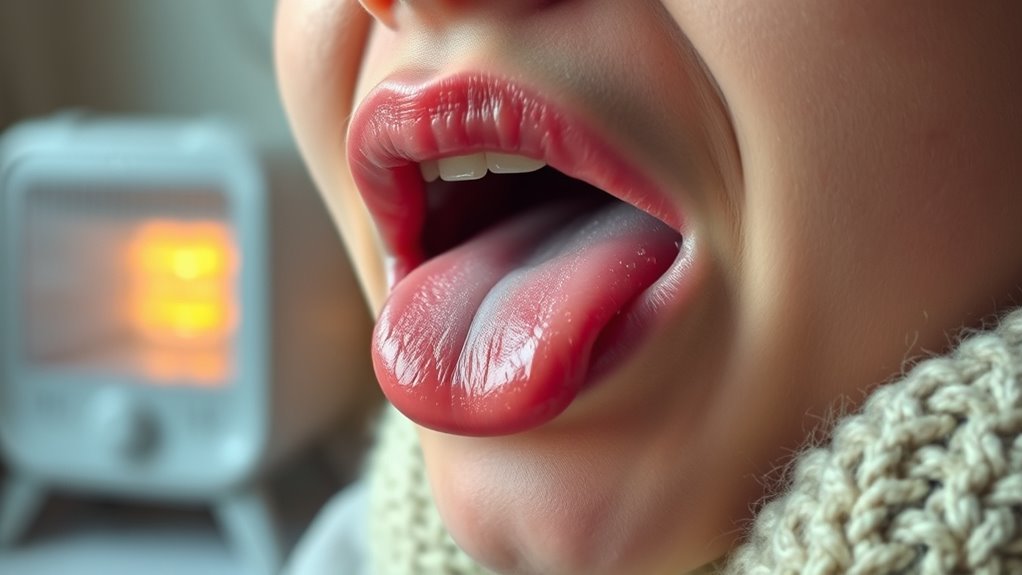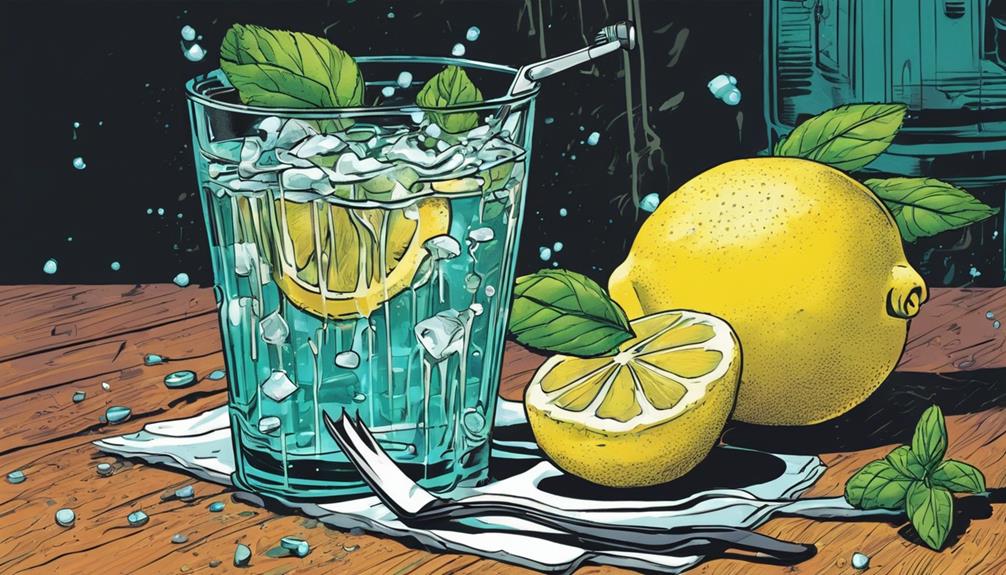To beat dry mouth during heater season, boost indoor humidity with a humidifier and stay well-hydrated by sipping water often. Avoid caffeine and alcohol, which dry out your mouth, and eat moisture-rich foods like fruits and soups. Chewing sugar-free gum or lozenges can stimulate saliva. Practice nasal breathing overnight and maintain good oral hygiene. For more helpful tips on staying comfortable, keep exploring ways to prevent dryness and keep your mouth moist.
Key Takeaways
- Use humidifiers in living spaces to add moisture and reduce indoor dryness caused by heaters.
- Stay well-hydrated by sipping water regularly and avoiding dehydrating beverages like caffeine and alcohol.
- Incorporate moisture-rich foods such as fruits and soups to support saliva production and overall hydration.
- Practice nasal breathing and avoid mouth-breathing to prevent further dryness of the mouth and throat.
- Maintain good oral hygiene and consider using alcohol-free mouthwashes to protect against dry mouth complications.

Dry mouth, also known as xerostomia, can be uncomfortable and interfere with your daily life. During the winter months, especially when you rely on heaters, this issue often worsens. The dry indoor air caused by heating systems strips moisture from your mouth, making it feel parched and sticky. To combat this, using humidifiers in winter can make a noticeable difference. These devices add moisture to the air, helping to keep your mouth and throat moist throughout the day. Setting up a humidifier in your bedroom or living space ensures that the air you breathe isn’t overly dry, reducing the severity of dry mouth symptoms.
Using humidifiers in winter keeps indoor air moist, easing dry mouth and throat discomfort.
In addition to humidifiers, paying attention to hydration tips is essential during heater season. Drinking water regularly is the simplest and most effective way to keep your mouth moist. Keep a water bottle nearby and sip frequently, even if you don’t feel thirsty. This habit prevents dehydration, which can exacerbate dry mouth. Avoid caffeinated or alcoholic beverages, as they tend to dry out your mouth further. Instead, opt for water, herbal teas, or sugar-free drinks that promote saliva production.
You can also boost hydration by incorporating moisture-rich foods into your diet. Fruits like watermelon, oranges, and strawberries contain high water content and can help maintain oral moisture. Soups and broths are excellent options as well, providing hydration and soothing your mouth. Chewing sugar-free gum or sucking on lozenges stimulates saliva flow, offering relief from dryness. These small actions support your body’s natural saliva production, which is essential for keeping your mouth lubricated and protecting your oral health. Additionally, ensuring your projector bulb maintenance is up-to-date can prevent unexpected issues if you are using projectors for entertainment or work during cozy winter nights.
Another tip is to avoid mouth-drying habits, such as smoking or breathing through your mouth. If you notice yourself mouth-breathing, try to consciously breathe through your nose, especially at night. Nasal breathing helps retain moisture in your mouth and throat. Additionally, maintaining good oral hygiene is critical; dry mouth can lead to increased bacteria growth, causing bad breath and dental issues. Use alcohol-free mouthwashes or rinses designed for dry mouth, and visit your dentist regularly to monitor your oral health.
Frequently Asked Questions
Can Certain Medications Cause Dry Mouth During Winter?
Yes, certain medications can cause dry mouth during winter. Medication side effects often include reduced saliva production, which worsens winter dehydration. When you take medicines like antihistamines or antidepressants, they can dry out your mouth even more. To combat this, stay well-hydrated, use saliva substitutes, and consider talking to your healthcare provider about alternative options if dry mouth becomes uncomfortable.
Are There Specific Foods That Help Alleviate Dry Mouth?
You can alleviate dry mouth by eating saliva-boosting foods like apples, carrots, and celery, which naturally stimulate saliva production. Hydrating snacks such as watermelon, cucumber, and oranges also help keep your mouth moist. Incorporate these into your diet to stay hydrated and promote saliva flow, especially during heater season when dry mouth is common. Drinking plenty of water alongside these foods further guarantees your mouth stays comfortably moist.
How Does Dry Mouth Affect Oral Health Long-Term?
Dry mouth can increase your risk of cavities by 30%, affecting your oral health long-term. When your salivary gland health declines, your oral tissue integrity weakens, leading to increased sensitivity and higher chances of infections. Without enough saliva, harmful bacteria thrive, causing decay and gum disease. To protect your mouth, stay hydrated, practice good oral hygiene, and visit your dentist regularly to maintain your salivary glands and overall oral health.
Can Humidifiers Completely Eliminate Dry Mouth Issues?
Humidifier effectiveness varies, so it might not completely eliminate dry mouth issues. While a humidifier adds moisture to the air, you should also try alternative remedies like staying well-hydrated, chewing sugar-free gum, and avoiding caffeine. Combining these strategies helps keep your mouth moist. Remember, if dryness persists, consult a healthcare professional for personalized advice, as relying solely on a humidifier may not fully resolve your dry mouth problems.
What Are Natural Remedies for Dry Mouth During Heater Season?
You can try natural remedies like drinking herbal teas, which soothe your mouth and keep it moist, and eating hydrating fruits like watermelon or oranges to boost saliva production. Sipping water frequently also helps, especially if you add a slice of lemon for extra flavor. Avoid caffeine and alcohol, as they can dry out your mouth further. These simple steps can make a noticeable difference during heater season.
Conclusion
Staying hydrated is your best defense against dry mouth during heater season. Remember, drinking plenty of water can reduce symptoms and keep your mouth moist and comfortable. Did you know that dehydration affects over 75% of adults at some point, often unnoticed? So, make it a habit to sip water regularly, use saliva substitutes if needed, and maintain good oral hygiene. These simple steps can make a big difference in keeping dry mouth at bay all winter long.









